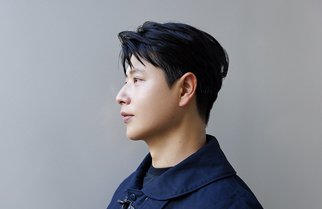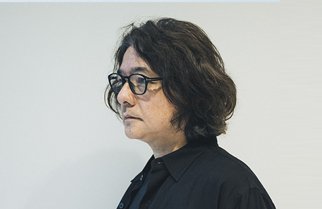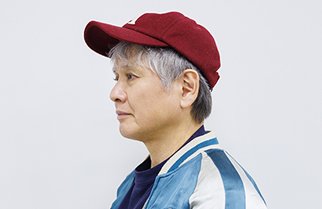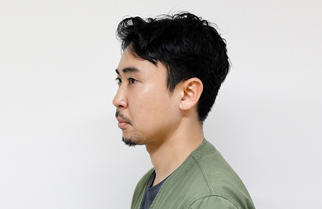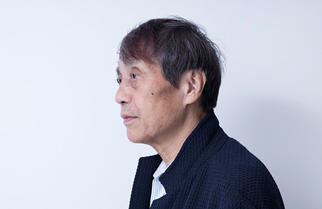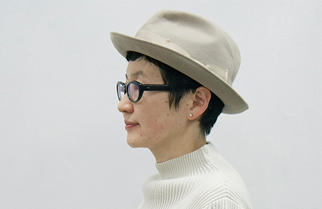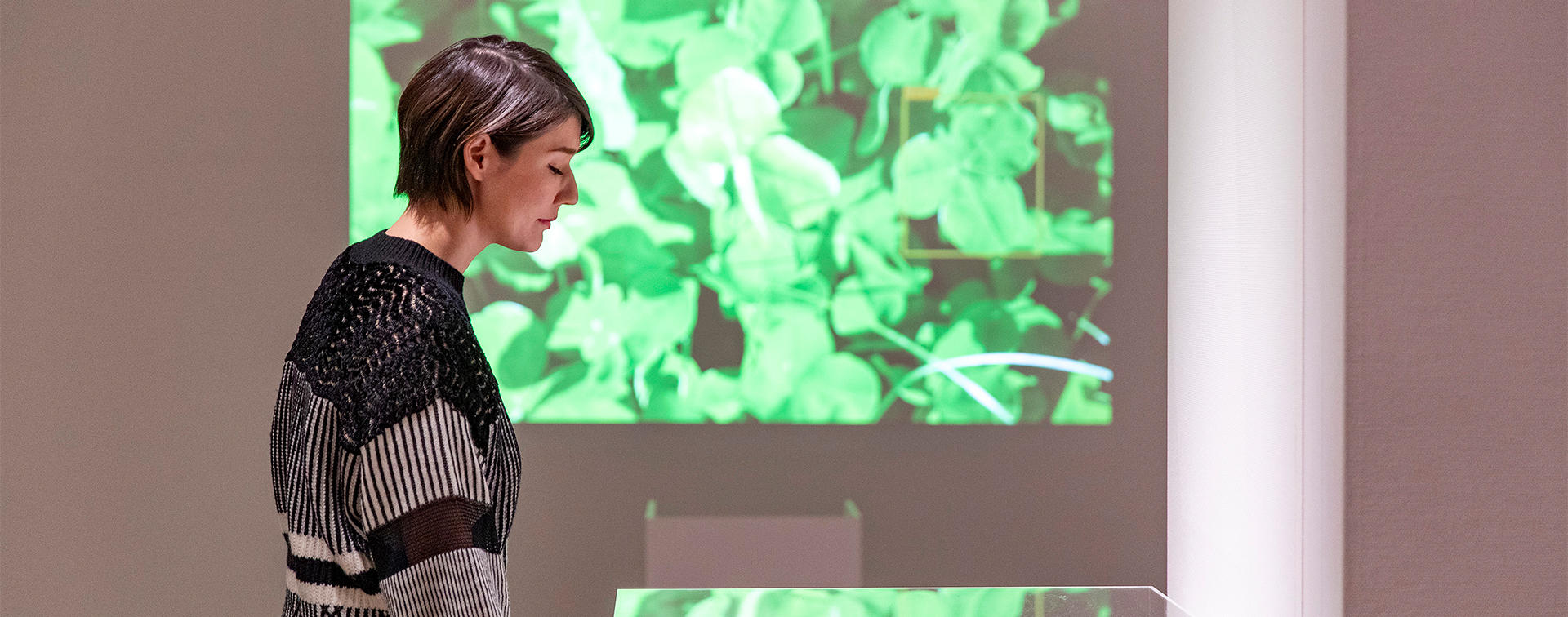
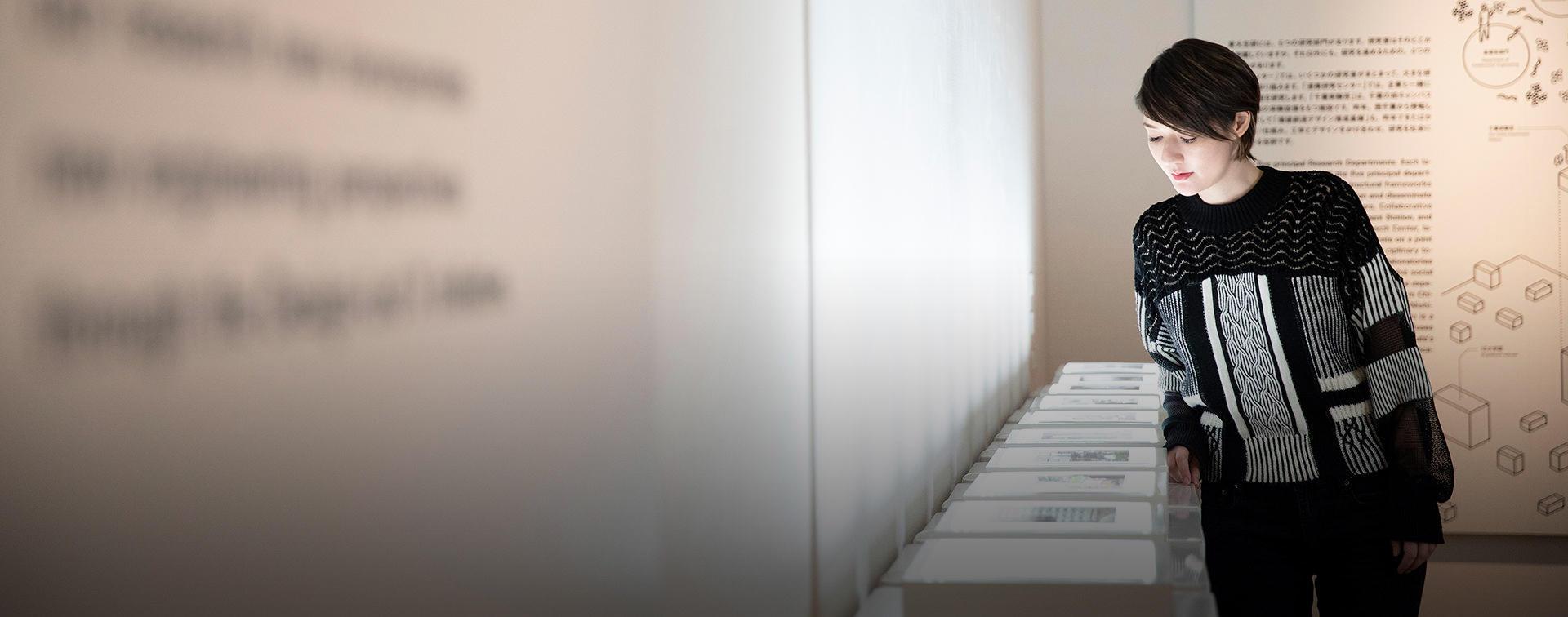
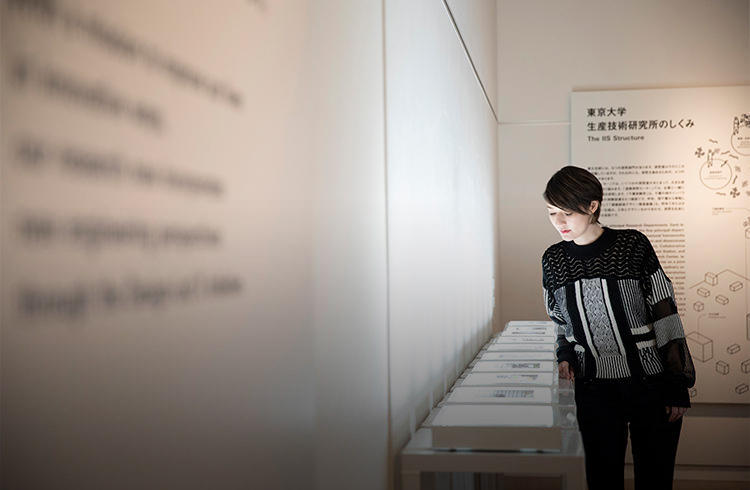
Presenting new lifestyles for women
Revealing the problems and doing what can be done now
Marissa Ozaki is a “rikeijoshi” (woman in science) and a contemporary artist, and her works released under the pseudonym Sputniko! have drawn much attention. Ozaki, who is currently project associate professor at the Institute of Industrial Science (IIS), the University of Tokyo, showed her new work at “Potentialities: Exhibition for a Possible Future (Engineering and Design)”, an exhibition marking the 70th anniversary of IIS and which was held at the National Art Center, Tokyo in December 2018. We went to the exhibition and interviewed Ozaki on topics ranging from how technology could change the future, to steps that could be taken in Roppongi, to Ozaki’s hopes for a world that is easier for women to live in.
The "pointless" pastime of searching for four-leaf clovers
For the exhibition "Potentialities: Exhibition for a Possible Future (Engineering and Design)" commemorating the 70th anniversary of ISS, I showed a work called "The Drone in search for the Four-Leaf clover". Only 0.001% of clovers are of the four-leaf kind which are said to bring happiness and my work is a short movie of an invincible drone equipped with AI (artificial intelligence) finding a four-leaf clover.
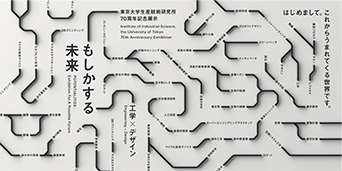
"Potentialities: Exhibition for a Possible Future (Engineering and Design)"
Showcasing the high technology and prototypes of the Institute of Industrial Science (IIS), the University of Tokyo, the exhibition was held at the National Art Center, Tokyo from Feb.1 to Dec.9, 2018. Shown at the exhibition was a movie called "The Drone in search for the Four-Leaf clover" about the drone project which Ozaki carried out with research laboratory members.
I came up with the idea when I was at the Komaba Research Campus of the University of Tokyo. There's a field-like space in Komaba where clovers grow and I was sitting there eating a rice ball, and I suddenly thought, "If there was a drone that could thoroughly search a field and find a four-leaf clover, would a person gain all the happiness in the world?" The great thing about the University of Tokyo is that when you communicate such an idea, there is bound to be someone who will say, "I could write a program for that", and willingly make the idea a reality. And my idea was wonderfully realized; a program was actually written to find four-leaf clovers through image recognition, and the program was installed on the drone. Of course, the work is my way of expressing black humor.
It's really difficult to find four-leaf clovers, and the very act of searching for something that is rarely found might be pointless and a waste of time, but there are times when doing pointless things gives us human beings a sense of satisfaction. We are increasingly using technology to do work more efficiently and to avoid things that are a waste of time. But there are the human pastimes like searching for four-leaf clovers, and when considering the issues of AI and labor, and AI and efficiency, the question that arises is: if we gave up these small moments of pleasure, how are we going to find happiness in our lives?
So this is a cynical work that criticizes Silicon Valley; it shows the laughableness of thinking that by using AI to search from the skies, we can solve a problem in one go and gain happiness in an efficient way.
Neither optimistic nor despairing of the future
Because of my work, I am often asked to depict an exciting view of a future where technology has advanced much more compared to the present. An exciting view is probably good for government or corporate advertisements and it would probably make the viewers feel happy. But I think it's very dangerous to look at only the positive effects of advanced technology on our future.
Many possibilities are opening up in the digital and bio areas, but at the same time, reasons for concern are also growing in number. Of course, the risk factors are recognized by the tech people and researchers. People have their own way of thinking and feeling about the future. There are many different attitudes - there are people who are trying to fight the negative factors and people who are despondent about the future and yet want to find a ray of hope. My own attitude is, "Let's do what we can at the current moment."
We cannot say for sure that technology will make our future better; when we look at the human race as a whole, there is a mountain of problems. What we can do now is to reveal those problems and to think of solutions. I can imagine a bad future, but I'm also one of the actors on the stage of life, and similar to pulling the rope in a tug-of-war, I can pull the future in the direction I think is best. I believe we are capable of shaping our future, so while I am not optimistic, I don't despair of what lies ahead.
Job titles and names are irrelevant
In 2017 I became specially appointed associate professor at ISS; when meeting people, I now often use my real name Marissa Ozaki instead of Sputniko! My work for the "Potentialities" exhibition was shown under my name and at the University of Tokyo, I am Professor Ozaki. (laughs)
Sputniko! is just one of my creations. She is a persona who talks about the things I want to tell people; she is a reliable character. I myself have always been really timid; I love programming but I'm not very good at making friends, and talking in front of people was not my strong point. That's why I created the character Sputniko! who could go up on stage and do the things I couldn't do.
This character began to make lots of appearances in the media and became acquainted with the people there, and it became a bit tiring to keep on being Sputniko! even in my personal time. So these days, when I meet new people, whether at the university or elsewhere, I say "My name is Ozaki." Of course, there are people who call me Sputniko! still exists. But I might create a different persona for myself in the future. I don't care what the methods, job titles or names are, as long as they help me to pull the rope in the right direction and realize the kind of future I have in mind.
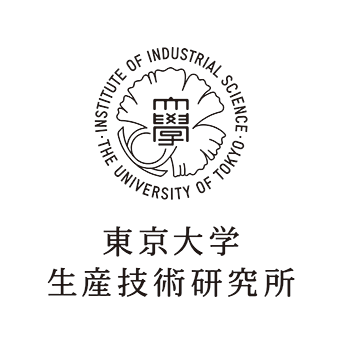
Institute of Industrial Science (IIS), the University of Tokyo
A research facility for engineering which has its main headquarters in Komaba, in Tokyo's Meguro city. Ozaki became project associate professor at the facility in October, 2017 and is doing innovative work that fuses design and engineering. She is also training personnel by teaching design engineering.
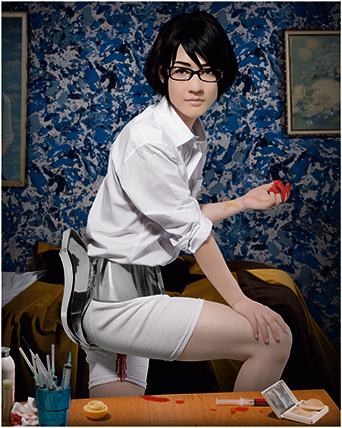
Sputniko!
Sputniko! is the pseudonym Ozaki adopts as a contemporary artist, and is also the name of a persona that she has created. Among the well-known works by Sputniko! are "Menstruation Machine, Takashi's Take" (2010), "Sushiborg Yukari" (2010), and "Toshima 8 Million Lab" which is shown permanently at Benesse Art Site Naoshima. (2016)
© Sputniko!

The mind is stimulated by the mysterious
Since I was in London for a long time, I'm often asked about the differences between London and Tokyo in people's approach to technology and design. The RCA (Royal College of Art) which I graduated from is a case in point. The university has historically had students from around the world gathering and holding discussions, so there are people from different cultures who see things - such as AI for instance - from different perspectives and in different contexts. There are all kinds of social problems in the world, and I think the awareness of those problems is higher in London than in Tokyo.
And something that is typical of RCA is that you have the freedom to make any kind of presentation you like. I've been impressed by such presentations recently. When science people make presentations, all the things they show on the screen make sense, but people from RCA show things that don't make sense at all. The other day, I went to a workshop held in London and attended a presentation about the future of mobility. Before the presentation began, the attendees were given pieces of paper that smelt of soil. Then the sound of rain filled the room, and I was wondering what was going to happen, but no mention was ever made of the smell of soil or the sound of rain. (laughs) The images were shown quickly on the screen, and no verbal explanation was given on how they were connected.
RCA (Royal College of Art)
Established in 1837, it is the world's sole university offering only postgraduate programs in art and design. Its curriculum is reputed to nurture the talents of students, making them the next generation of global artists and designers.
It made me realize that when a presentation gives you an answer, you may understand it, but your mind doesn't necessarily expand. But a mysterious presentation makes you think for yourself; with an incomprehensible thing, your mind is apparently stimulated. Maybe what I saw was just a bad presentation, but I loved it.
The number of foreign students at the University of Tokyo has increased recently, and there are many students from RCA-ISS Tokyo Design Lab, so there's a global mindset and I think it's a very nice environment. The technology at the university is of a high standard and there are numerous outstanding students. I get the impression that things are changing fast - after all, they let a person like me become a teacher.

RCA-IIS Tokyo Design Lab
A design project set up in December 2012 for collaboration between the Royal College of Art (RCA) and the Institute of Industrial Science (IIS), the University of Tokyo. Its key concept is to combine design with engineering.
Thinking of ways to connect on the premise that we are all different
I think London is the most creative city in the world. It's a city where people are constantly thinking of ways to connect with each other on the premise that we are all different.
I lived in London for seven years from 2003. Back in Tokyo, what makes me sad is that I always have this feeling of being isolated. People tell me that I'm special or that I'm unconventional; while those words can be taken as compliments, I feel as if people are saying, "You're different from us" and sort of rejecting me.
In contrast, I feel comfortable in London where there are people of different races and cultural backgrounds, and where everyone has their own individual values and beliefs; because there are so many differences, there is the fundamental notion of "Everyone is different. So how can we connect with each other?" In Japan, I feel as if I will be eternally "different." And people don't seem to make much effort to connect.
Another reason why I think London is creative is that you are free to be experimental. The environment allows you to start a project and try something without spending a fortune. Concert tickets are cheap and admission is free at nearly all the art museums, so I was able to look at a lot of art and enjoy myself. When I went to London for the first time, the place I lived in was tiny, but I decided to think of the Tate Modern and the Design Museum as extensions of my home because they have free admission. And then I was able to marvel, "How huge my home is!"
Tate Modern and the Design Museum
Tate Modern is a contemporary art museum in London, housing works by artists such as Pablo Picasso, Salvador Dali and Henri Matisse. The Design Museum, showing all forms of contemporary design, was founded by Terence Conran and moved to its new location in Kensington in November 2016.
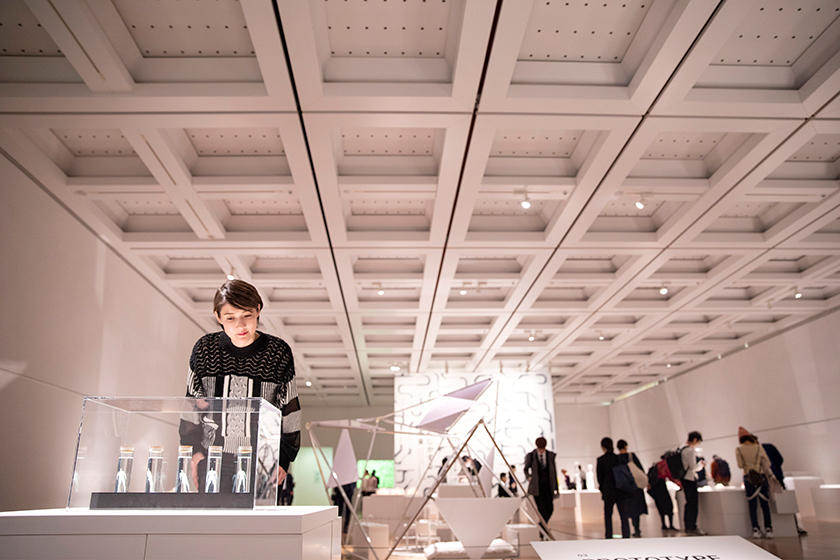
A cheap and imperfect place in Roppongi for artists to make experiments
To turn Roppongi into area of art and design, I think it would be good if there was a place where artists can live and make works. By offering rooms and empty houses for extremely low rents, Roppongi would probably be transformed into an area of art and design in a very real sense.
I think that genuine art and culture are born from young students and young artists. In the east of London, there is an area where prices are cheap, and you will find groups of about ten young people living together in a warehouse, or artists using abandoned buildings for their activities. I think the real spirit of art is found in those underground-like places.
When one wants to make something new and decides to become an artist, one probably has little money, unless he or she happens to be the son or daughter of a "zaibatsu" person. When I returned to Japan at age 25, I was really poor, and I had almost no opportunity to come to Roppongi where prices and rents are so high. Roppongi is probably a good place for adults with high-paying jobs who want to appreciate and buy art, but young artists cannot even come near the place.
If you are going to establish a place for young artists in Roppongi, it would ideally have a laid-back atmosphere and be the sort of place where everyone can sleep together huddled on the floor. It would be easier for artists to make all kinds of experiments if the place is not too tidy or clean. For example, if there is a building that is to be demolished, you could ask artists to freely exhibit their works on a first-come basis. The place should not be too polished or shiny. Perhaps in a way, Roppongi is seeking perfection, but a place that is not too perfect is desirable. Another thing I desire is for young people without money to be treated with kindness.
Creating a world where women can live more easily
I've recently realized that my wish is to create a certain future, and the future I have in mind is a world where women can live more easily. It would be nice if I could communicate that from Roppongi.
I was born a woman, and I work in science; I have many dreams and ambitions but I was born and raised in Japan, and unfortunately, there are few female researchers in the older generation, few female politicians and few women in management positions. At school, we are told that both boys and girls should have dreams and make an effort, but there is still the social convention that after marriage, women should do the housework and raise children. In 2018, it came to light that Tokyo Medical University has been reducing the points from the entrance exam scores of all female applicants. Girls in Japan have been trying hard, overcoming the prejudiced views of "You are female, and you want to become a doctor? You are female, and you want to study?" and yet, universities are discriminating against them. This is an unbelievable human rights issue.
It's not only Japanese women who face this problem of prejudice and gender discrimination; when I was in London, women from other Asian countries that I met also had the same problem. In the Asian culture, the deep-rooted notion concerning marriage and married couples is that the woman should support the man. While people may say it's alright for women to work, when women marry, their husbands have an ingrained attitude of "Of course, you must support me." It's as if men think women are weaker and less intelligent than themselves. On television, when they show a renovated kitchen, someone says, "Madam will be delighted with this easy-to-use kitchen." As if only the wife uses the kitchen!
I think that such values scare a lot of women and hinder them from finding partners. But there is a time limit for having babies which cannot be changed, and a woman can be undecided or busy, and before she knows it, time has flown past, and she will be asking herself, "When am I going to have a baby? Who am I going to have it with? Is it possible for me to conceive?"
I want to free women from their biology
It is still considered taboo for an unmarried woman to have her eggs frozen, but I have an interest in the field of freezing sperms and eggs. I'm also interested in new types of family, and I think a woman might even choose raising a child with another woman. I would like to propose and communicate new lifestyles for women and help to alleviate their burden as much as I can. What I ultimately want to do is to liberate women from their biology.
Since my goal has become clear to me now, I'm turning down all offers for making artwork that depict how technology will create an exciting future. This is no time for depicting an exciting future! I haven't received any offers to do work related to gender-discrimination, but art isn't about doing things because people asked you to do them. Maybe the liberation of women is not the kind of the future that old male politicians and old men at corporations want to see, but it's up to us to make our own future. I want to do my best to create the future I wish for.
I'm actually thinking of setting up a company. Since other Asian countries have the same deep-rooted problem of gender discrimination, there must be a lot we can do by taking the whole of Asia into perspective. Maybe people will think Marissa Ozaki is saying things that are extreme, but I won't mind. If I say and do things that are a bit extreme, it will probably lead to more discussions and more choices. Some women might think, "I wouldn't go that far, but I would like to move forward too." If my actions could help women to take just one step forward, it would be worthwhile.
Editor's thoughts
Even if you didn't realize who she was, you would surely turn your head to look at Marissa Ozaki-san if she passed by you in the street. Such is her beauty. And she has a strong will which became increasingly evident as I listened to her. I was intrigued by her many aspects - I could not make out which parts were Sputniko!, Marissa Ozaki, artist and researcher. What left an impression on me was her remark that she doesn't care what the methods, job titles or names are as long as they contribute to creating the future she wants. I am expectant about Ozaki-san's future activities as she sets out to make the world an easier place for women to live in. (text_tami okano)




